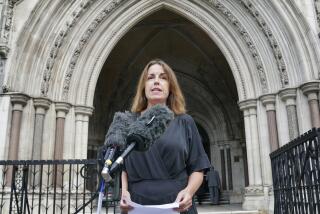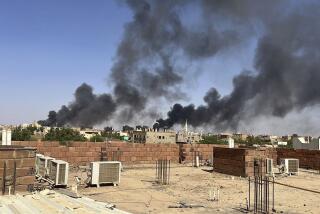U.N. Will Help Afghan Government Investigate Reports of Mass Graves
- Share via
KABUL, Afghanistan — KABUL, Afghanistan -- Treading cautiously on the issue of atrocities in a country that has seen many in 23 years of war, the United Nations said Saturday that it will help investigate several mass graves in northern Afghanistan this spring but will leave it up to Afghans whether and how to proceed with any evidence that is uncovered.
Site work for a U.N.-sponsored feasibility study for an investigation has just been completed, and excavations at three or more sites around Sheberghan and Mazar-i-Sharif may begin as early as April, a U.N. source said Saturday on condition of anonymity.
Due to the political climate, the United Nations will not press the Afghan government to launch a truth commission or war crimes tribunal even if a wealth of evidence indicating atrocities is found, sources said. Past U.N.-led investigations of alleged mass slayings in Rwanda, Guatemala and the Balkans have led to such panels.
“In our view, what is to be done with the results of the investigation needs to be decided by the Afghans in a nationwide debate. In a country with transitional justice, one just emerging from a long period of conflict, conditions might not be mature enough to deal with human rights violations of this magnitude,” said an international human rights expert working in Afghanistan who asked not to be named.
Further complicating the situation is that allegations of mass graves abound in Afghanistan, a source said. That presents fair-minded officials with the problem of where to start digging.
The investigation in northern Afghanistan began after reports surfaced that hundreds of captured Taliban fighters died last year in metal shipping containers during their transfer to prisons by Northern Alliance militiamen. Taliban prisoners at the Sheberghan prison told a delegation from the U.S.-based Physicians for Human Rights last January that hundreds of their comrades never arrived at the prison after giving themselves up in the city of Kunduz.
In a report in August, Newsweek magazine said as many as 1,000 people may have suffocated in the containers. Spokesmen for Northern Alliance leaders have acknowledged that some captured Taliban fighters died but say that no more than 200 perished. They contend that the deaths were not intentional but were caused by disease and battle injuries.
Among the sites likely to be analyzed is one in Dasht-i-Leili, near Sheberghan, where the principal mass grave of the Taliban prisoners is said to be. But in a bid to assuage Northern Alliance leaders who now control the region and who initially resisted the investigation, international officials have agreed to study two or more sites around Mazar-i-Sharif that allegedly contain victims killed by the Taliban in 1997 and 1998 -- before the U.S.-led force and the Northern Alliance drove the regime from power last year.
Before the multisite plan was hammered out, Northern Alliance warlords told the United Nations that they could not guarantee the safety of investigators, drawing a rebuke from Lakhdar Brahimi, the U.N. special envoy to Afghanistan.
U.S. human rights groups called for a probe of the shipping container deaths after witnesses said U.S. soldiers may have been present during the transport. U.S. troops were seen accompanying warlord Abdul Rashid Dostum’s forces during several stages of the prisoner transfer, according to news reports. But the Pentagon said this summer that an internal inquiry found no U.S. involvement in the deaths.
Site work for the U.N.-sponsored feasibility study for the probe was performed by William Haglund, a noted forensic anthropologist from Seattle who has analyzed mass graves in Rwanda, the Balkans and Sri Lanka and who visited Sheberghan prison with the physicians group.
In an interview after a recent trip to Afghanistan, Haglund described a grave site he visited as “very large” but declined to estimate how many victims could be buried there. Haglund is expected to make recommendations to the U.N. in late January.
More to Read
Sign up for Essential California
The most important California stories and recommendations in your inbox every morning.
You may occasionally receive promotional content from the Los Angeles Times.













